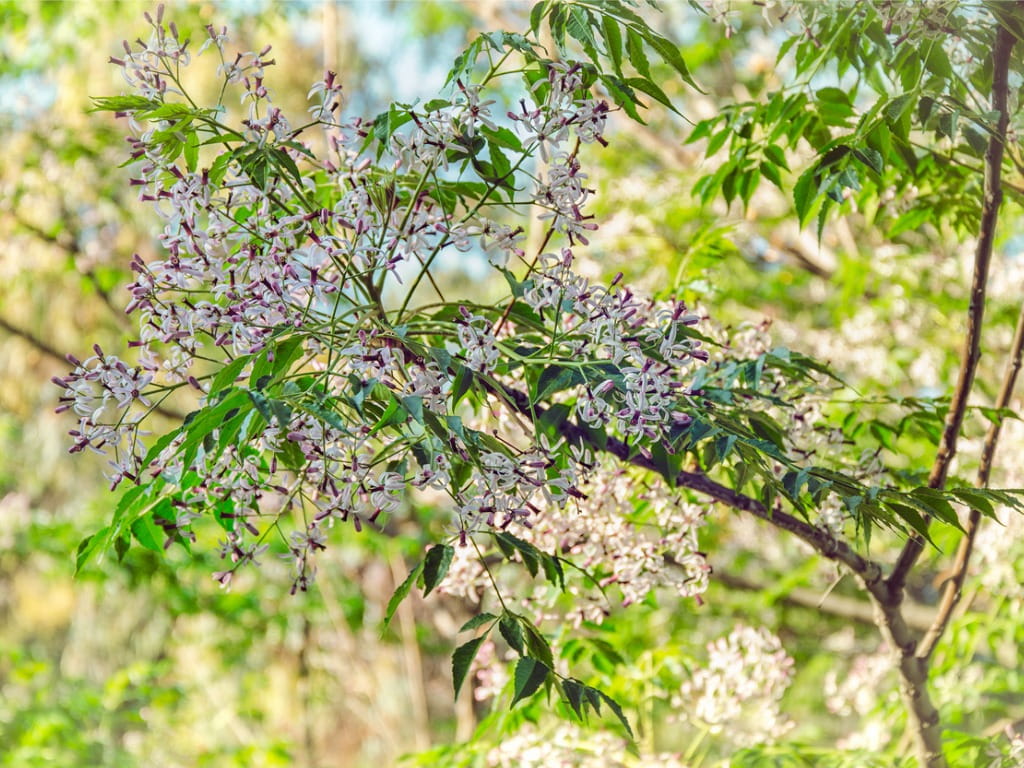Are Chinaberry Trees Poisonous?

The Bottom Line
Chinaberry trees are an invasive species that can be harmful if any part is chewed on or swallowed. Ingestions of small amounts of plant material can cause gastrointestinal upset such as vomiting and diarrhea within 1 hour. Most reports of large ingestions resulting in severe symptoms have occurred in animals.

What is the chinaberry tree?
The chinaberry tree (Melia azedarach), also known as white cedar berry, Indian lilac berry, and Texas umbrella berry, is an ornamental tree that is now considered an invasive species in the US. All parts of the chinaberry tree can result in poisoning if ingested. The berries of chinaberry trees are round and start off green when immature but eventually turn yellow as they ripen. The berries are actually seed pods that contain 3–5 black seeds inside a stone pit. These berries are the most toxic part of the plant and ripe, yellow berries might be more harmful than unripe, green berries. The berries have a very bitter taste, so it’s unusual for an individual to eat a large quantity of them.
How common is chinaberry poisoning?
While there are many reports of animals being poisoned by chinaberry, reports of serious human exposures in the US are very rare. Symptoms can develop as soon as 1 hour after ingestion of any part of a chinaberry tree. However, in some cases, the onset of symptoms may be delayed by several hours. After chronic consumptions of parts of the plant, symptoms can be delayed by weeks. Most reports of large ingestions resulting in severe symptoms occurred in animals.
What are the symptoms of chinaberry poisoning?
Symptoms that can develop after a small chinaberry ingestion are expected to be mild and include vomiting and diarrhea. Larger ingestions can result in moresevere symptoms including sleepiness, muscle weakness, seizures, liver injury, respiratory failure, and even coma.
What to do if someone eats chinaberry
If someone has swallowed any part of a chinaberry tree, you can help them by following these steps:
- Gently wipe out their mouth.
- Have them rinse and spit with water to remove remaining plant material from their mouth.
- They can drink a few small sips of water to wash the remaining material into their stomach.
- If they are experiencing nausea or vomiting, keep them hydrated with small sips of clear fluids.
If someone has been unintentionally exposed to part of a chinaberry tree, get an immediate personalized recommendation online or call 1-800-222-1222. Both options are free, confidential, and available 24 hours a day.
Lindsy Liu, PharmD
Certified Specialist in Poison Information
Poisoned?
Call 1-800-222-1222 or
Prevention Tips
- Have all of the plants in and around your home identified by a knowledgeable expert.
- Keep the plants out of reach of pets and young children.
- Let older children know that no part of a chinaberry tree should be eaten.
- Use our plant guide to help with selection of plants in and around your home.
This Really Happened
Case 1: A family called Poison Control after an 18-month-old girl ate half of a chinaberry fruit. The girl had no symptoms at the time of the call, and the family was instructed to watch for signs of severe gastrointestinal upset for 8 hours. No symptoms developed.
Case 2: A 51-year-old man swallowed an herbal product containing chinaberry leaves. On the first day of the exposure he took two doses of the product and felt weak and tired. The next day, after taking a third dose, he developed a headache, blurred vision, nausea, heart palpitations, and numbness of his head and mouth. All of these symptoms resolved after 1 day in the hospital (from Phau et al., 2008).
For More Information
Plant toolbox: Melia azedarach. Raleigh (NC): NC State Extension [cited 3 Sep 2022].
References
Poisoned?
Call 1-800-222-1222 or
Prevention Tips
- Have all of the plants in and around your home identified by a knowledgeable expert.
- Keep the plants out of reach of pets and young children.
- Let older children know that no part of a chinaberry tree should be eaten.
- Use our plant guide to help with selection of plants in and around your home.
This Really Happened
Case 1: A family called Poison Control after an 18-month-old girl ate half of a chinaberry fruit. The girl had no symptoms at the time of the call, and the family was instructed to watch for signs of severe gastrointestinal upset for 8 hours. No symptoms developed.
Case 2: A 51-year-old man swallowed an herbal product containing chinaberry leaves. On the first day of the exposure he took two doses of the product and felt weak and tired. The next day, after taking a third dose, he developed a headache, blurred vision, nausea, heart palpitations, and numbness of his head and mouth. All of these symptoms resolved after 1 day in the hospital (from Phau et al., 2008).
